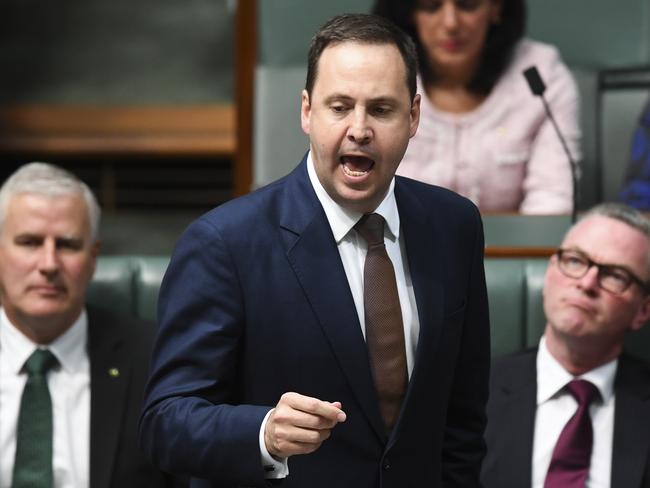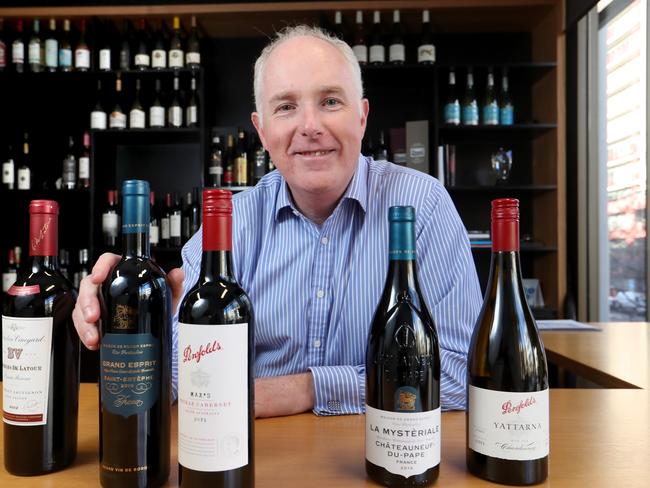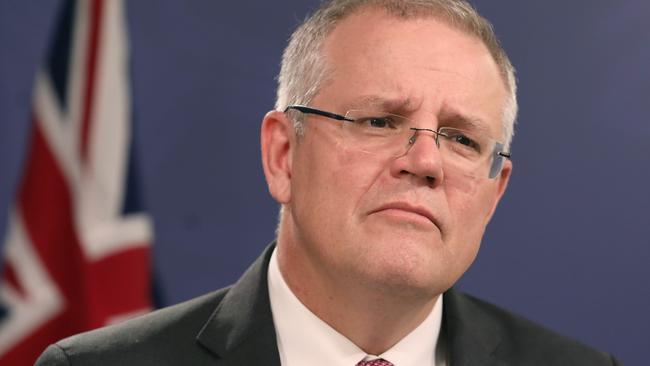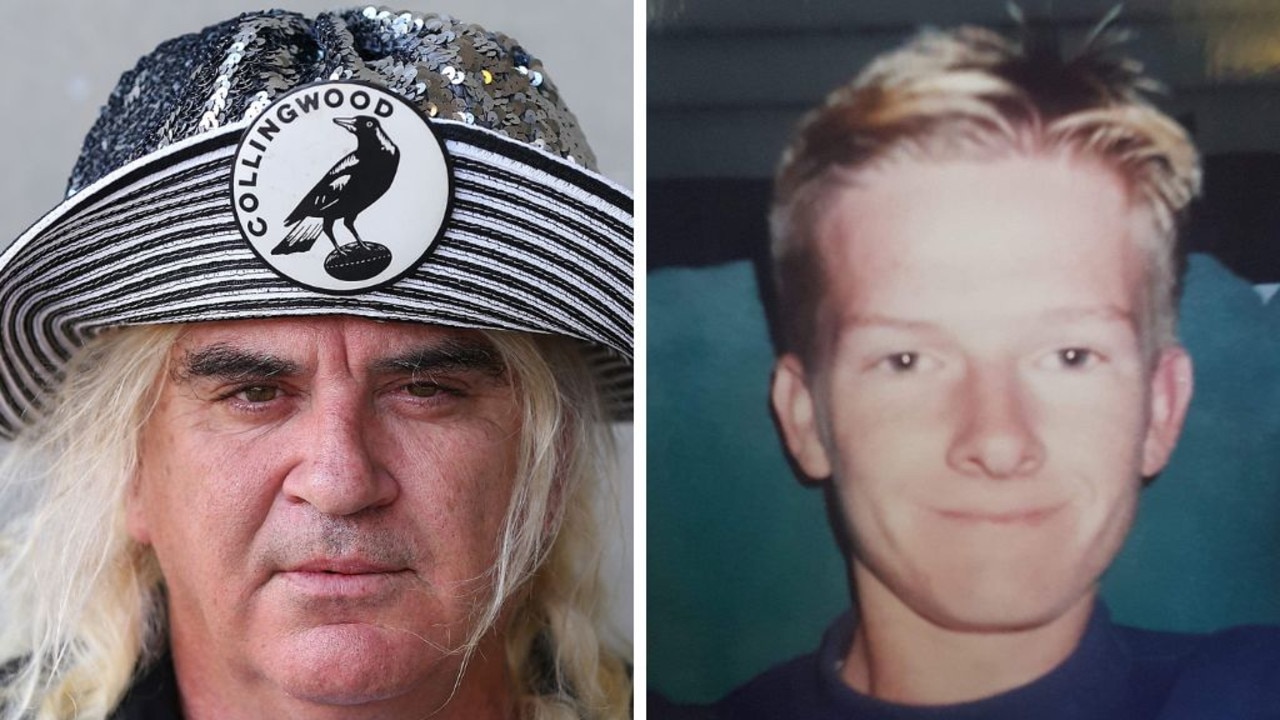Australian economy outstrips expectations with biggest growth in two years, according to ABS national accounts
TRADE Minister Steve Ciobo has rebuffed concerns China has placed a “go-slow” on wine and beef imports, as the Treasurer trumpeted Australia’s better-than-expected economic growth.

National
Don't miss out on the headlines from National. Followed categories will be added to My News.
TRADE Minister Steve Ciobo has rebuffed concerns China has placed a “go-slow” on Australian wine and beef imports.
The Minister stared down a grilling on Australia’s trade relationship with the Asian superpower after a major speech in Canberra today, labelling the trade partnership “very strong, very broad and very deep”.
He admitted there had been an “irritant” in the relationship over wine but insisted efforts by Australian diplomats to get product moving again had “yielded fruit”.
“I’m informed that the bulk of the product that China was seeking additional paperwork around is now moving,” he told the National Press Club.

Wine producer Treasury Wine Estates had approached the minister before his trip to China last month to raise concerns over extra regulatory requirements recently imposed by Beijing over certificates of origin that were preventing its product moving through ports.
Mr Ciobo said only the one producer had raised concerns with him but there were anecdotal reports of other Australian wine producers were facing extra regulatory requirements to get their product into China.
He rejected the term “go-slow” to describe Beijing’s actions, highlighting that growth in wine exports to China had been “tremendous”, but he acknowledged there was an “irritant” over wine at the moment.
“When you look at the growth we’ve had of beef and wine exports, I think it is important that we don’t mischaracterise what is happening,” he said.
He later added that the vast bulk of Australian products were not encountering difficulties.
The Turnbull Government is attempting to repair diplomatic relations with Beijing which has deteriorated since late last year.
Senior ministers have been refused visas to China in recent months amid the diplomatic chill and there are fears it is now beginning to impact trade.

Mr Ciobo, the first minister to visit the country this year, dodged questions at the press club on why he was unable to meet his Chinese counterpart Zhong Shan when he visited Shanghai last month.
He also dodged questions on whether he believed Prime Minister Malcolm Turnbull would visit the country later this year.
Me Ciobo said the Prime Minister had “indicated a willingness to go to China” but it depended on whether there were other competing demands in terms of time.
He characterised his own trip to China as “very successful”.
In his speech before the Q&A session, Mr Ciobo outlined the government’s opposition to protectionist stances on trade.
While he made no mention of US President Donald Trump’s approach, and his recent announcements on steel and aluminium tariffs on Canada, Mexico and the European Union, Mr Ciobo said there had been political forces attempting to exploit concerns about free trade both in Australia and abroad.
AUSTRALIAN ECONOMY ‘BACK ON TOP’
AUSTRALIA’S economy has outstripped expectations with the biggest growth in more than two years, largely driven by exports.
The latest national accounts, released by the ABS today, show Australia’s economy expanded by 1 per cent in the March quarter — double the rate of growth recorded in the last three months of 2017.
It’s contributed to 3.1 per cent GDP growth over the year and the best growth figures Australia has seen since mid 2016. Economists had expected quarterly growth of almost one per cent.
Treasurer Scott Morrison has welcomed the figures, which put Australia among the top five fastest growing economies in the world along with China, Indonesia, India and Turkey.
“Australia has climbed back to the top of the leaderboard, which we’ve been seeking to do now the past few years, and we are up again, leading the advanced economies of the world, bettering the average growth in the OECD, and, of course, all of the G7 nations once again,” he said.
MORE: Tech giants forced to unlock data in terror fight
MORE: Authorities ‘reluctant’ to issue airline terror warnings
MORE: Aussie teen ‘wanted to be a suicide bomber’

Mr Morrison said the figures “validated” his forecasts in the 2018 Budget.
Aussies were spending more on things like household utilities and furniture, as well as commercial vehicles in the March quarter.
Mr Morrison highlighted the “very strong surge” in vehicles, particularly individuals buying utes.
But he noted there was a “drop-off” in spending on eating out at cafes and restaurants and alcohol.
“This underscores the need to deliver the personal tax plan that we outlined in the Budget,” Mr Morrison said.
“That personal tax plan is there to support all working Australians, not just some, and importantly, our personal tax plan is not being funded by punishing other working Australians with higher taxes.”
ABS data shows household consumption grew by 0.3 per cent in the quarter and 2.9 per cent through the year.
But the household savings ratio fell to 2.1 per cent — it’s lowest rate in more than a decade.
Shadow Treasurer Chris Bowen said the “headline figure” of 1 per cent growth was welcome but warned consumption data told another story.
“Today’s data is a stark reminder that households in particular continue to do it tough under this government,” he said.
“Household consumption remains soft and that’s a concern going forward.
“It contributed just 0.2 per cent of today’s figures, well below average.
“Now, of course, again, that underlines the economic case for Labor’s bigger and better and fairer tax cuts, which are provided earlier than the government’s in 2019.”
Overall, the nation’s economic growth was driven in large part by exports.
“Growth in exports accounted for half the growth in GDP, and reflected strength in exports of mining commodities,” ABS Chief Economist Bruce Hockman said.
Earlier, Reserve Bank of Australia governor Philip Lowe said recent data had been consistent with its central forecast for growth to pick up to an average of just above three per cent in 2018 and 2019.
However, following Tuesday’s monthly central bank board meeting, he said household consumption was a continuing source of uncertainty given slow wages growth and high household debt.
The RBA board left the official cash interest rate at 1.5 per cent in June.
Consumer confidence has eased back in the past two weeks from the positive mood prompted by last month’s federal budget.


